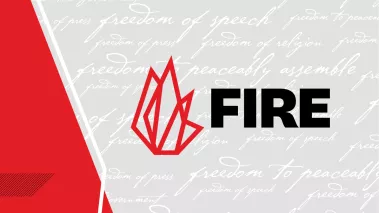Table of Contents
Political Litmus Test for Faculty at Virginia Tech

Peter Wood at the National Association of Scholars has drawn attention to a disturbing prospect at Virginia Tech — a requirement that all candidates for tenure and promotion display "active involvement in diversity," threatening the academic freedom and freedom of conscience of Virginia Tech's faculty. This new requirement is reminiscent of FIRE's 2001 case at Bucks County Community College, in which BCCC attempted to require applicants for new faculty to "provide a brief statement of your commitment to diversity and how this commitment is demonstrated in your work." Under pressure from FIRE, BCCC dropped the requirement.
Of the similar requirement now threatening academic freedom at Virginia Tech, Peter Wood writes that
Virginia Polytechnic Institute and State University—Virginia Tech—has imposed a political test on candidates for promotion and tenure. Specifically, Virginia Tech's College of Liberal Arts and Human Sciences is making active support and advancement of "diversity" a requirement for faculty to keep their positions and for promotion.
This is a highly unusual step—one that flouts academic freedom. "Diversity" is not a category of academic accomplishment equivalent to high-quality teaching or success in scholarly research and publishing. "Diversity" is an ideology. The term summarizes a set of objectives popular on one part of the political spectrum. Virginia Tech, which is a public university, has no business turning a partisan political credo into a test that must be passed for faculty members to win tenure or to advance in rank.
Faculty members at most colleges and universities are evaluated for promotion and tenure on the basis of their teaching, scholarly performance, and to a lesser extent, on their service to the institution. The "service" requirement typically means the candidate's record of serving on various departmental and college committees. Virginia Tech appears to have seized on this third, minimal requirement as the pretext for creating a political litmus test for faculty members.
[ . . . ]
To start with, "Contributions to diversity" begin with "self-education." [Emphasis in Wood.] The first duty of the faculty member is to achieve ideological conformity, and the Dossier Guidelines gently explain how. This consists of submitting to training by the good folks at the Equal Opportunity Office, and at CEUT (Center for Excellence in Undergraduate Teaching), and attending lots of events such as "the Diversity Summit, identity group celebrations, Campus Climate Checkup, MLK events, special speakers, annual AdvanceVT, Scholarship of Diversity conferences, events hosted by Cranwell Center or Disability Services," and etc.
"Identity group celebrations" is an interesting way to demonstrate commitment to diversity. Is a pro-Israel celebration of the defeat of Palestinians going to count? What about a pro-Palestinian celebration of the defeat of Israelis? Or a pro-Catholic celebration of California's Proposition 8, or a pro-homosexual celebration of the possible defeat of Proposition 8? Is a racist or sexist identity group going to count?
All this stuff testifies to the conviction of the senior Virginia Tech administrators that the University's faculty members give little credence to the concept of "diversity." Many of those faculty members apparently have to be coerced into agreeing with the doctrine. No such assumption comes with the other kinds of service. It is assumed on those cases that the value of going to workshops, serving on committees, and assisting students in extra-curricular activities is self-evident. Only "diversity" requires reprogramming the ideas, ideals, and social attitudes of faculty members.
Second, it turns out that embracing "diversity" requires changing everything else a faculty member does: student advising, scholarship, research methods, syllabi, teaching styles, student recruitment, and much more. What kind of "service" is Virginia Tech talking about that suddenly balloons into an across-the-board rehabilitation of the faculty member's whole life?
If you don't want to take Wood's word for it, he links to the documentation so that you can read it for yourself:
It is not "diversity" itself that is the problem here—this is a valid possible goal, among many others, of a university—it's the way that Virginia Tech requires faculty members to demonstrate a commitment to it in order to be rewarded rather than penalized. As Supreme Court Justice Robert Jackson so eloquently wrote in West Virginia State Board of Education v. Barnette, 319 U.S. 624 (1943), "If there is any fixed star in our constitutional constellation, it is that no official, high or petty, can prescribe what shall be orthodox in politics, nationalism, religion, or other matters of opinion or force citizens to confess by word or act their faith therein."
Recent Articles
Get the latest free speech news and analysis from FIRE.

Can the government ban controversial public holiday displays?

The trouble with banning Fizz

FIRE's 2025 impact in court, on campus, and in our culture
